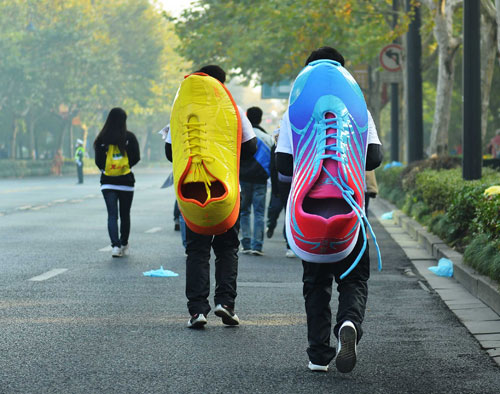Running into danger
Xiong Xibei, a 61-year-old Beijing Sport University track-and-field professor and a referee of the Beijing International Marathon from 1981-2011, says: "Challenge yourself, but never push too hard."
Xiong was a middle school physical education teacher in the 1970s.
Back then, his girl students could easily run 5 km and the boys had no problem finishing 10 km. But people are in worse shape today, he says.
Liao says: "It's impossible for many people to run a full marathon. You can't do it unless you're in great health. It's an endurance event that challenges the heart, lungs, blood vessels and nerves."
The extreme exertion strains the metabolism's ability to meet energy demands and challenges the organs to properly excrete waste.
This can cause blisters, sprains, strains, dehydration, heart attacks and stroke.
Wu Xinmin, a public servant in Beijing, knows he should run at a comfortable pace.
The 32-year-old grew up in the countryside and is no stranger to manual labor. So, he thought nothing of signing up for the full Beijing International Marathon in 2003.
He'd never run more than 10 km and didn't prepare for the race. Wu had to stop at about 20 km, when he felt completely breathless.
He felt extremely tired in the following days and found it painful to go up stairs.
Wu prepared well for the following year and began training about three months before the race. He ran five times a week, starting at 5 km and working his way up to 20 km.
He completed the marathon in four hours and 20 minutes — not bad for an amateur.
"The preparation is time-consuming but pays off," Liao says.
"Listen to your body. Don't force yourself, or you'll run into trouble."
Contact the writers at liuzhihua@chinadaily.com.cn and tangyue@chinadaily.com.cn.
 |
|
People ran with models of running shoes on their back at the Hangzhou International Marathon in Zhejiang's provincial capital on Nov 18. Long Wei / For China Daily |
















